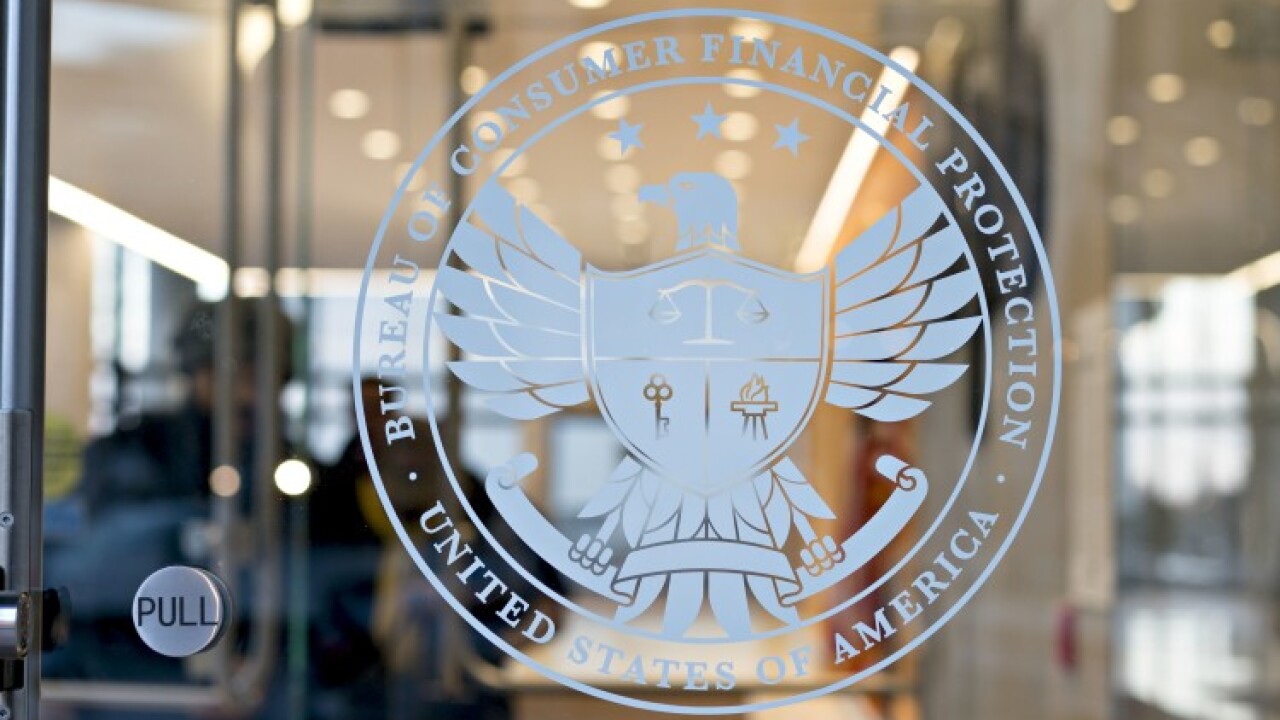-
The agency sought to provide certainty that most actions from the past eight years remain in effect despite the ruling that the bureau's leadership structure is unconstitutional.
July 7 -
The agency delivered long-anticipated regulatory relief to the small-dollar loan industry by eliminating ability-to-repay requirements imposed under the bureau’s former director.
July 7 -
Tom Pahl, a former longtime regulator at the Federal Trade Commission, has led key rulemaking efforts for the consumer bureau.
July 2 -
The agency has proposed letting firms seek specific guidance, which can be applied to other institutions. But consumer groups worry the plan circumvents formal rulemaking.
July 1 -
The Supreme Court threw out a key statutory provision concerning the agency’s leadership structure, but the presidential election and possible legislative reforms could bring about more changes to the embattled bureau.
June 29 -
In a split 5-4 decision, the justices gave presidents new power to remove the agency's head at will. The ruling could have far-reaching implications for other regulators with single directors.
June 29 -
With just 13 decisions remaining on the docket this session, the high court's highly anticipated ruling in a case challenging the agency's leadership structure could come as early as next Monday.
June 25 -
An imminent high court ruling about the independence of the bureau's director, coupled with an election victory for Joe Biden, could doom a plan to extend GSEs' exemption from tough debt-to-income requirements on mortgages.
June 24 -
The Consumer Financial Protection Bureau plans to change the definition of what constitutes a qualified mortgage from a 43% debt-to-income limit to a price-based threshold, and further extend a temporary exemption given to Fannie Mae and Freddie Mac.
June 22 -
A lawsuit filed Tuesday argues that the bureau's establishment of the panel looking into regulatory changes violated the Federal Advisory Committee Act.
June 16 -
The agency has freed companies from reporting requirements and provided flexibility on exams to help them deal with COVID-19 fallout. It has also finished other regulatory relief efforts that were in the pipeline before the pandemic hit.
May 18 -
Complaints to the bureau hit an all-time high in April. More than one in five said servicers wouldn't grant deferrals, forced borrowers into forbearance or violated other requirements of the coronavirus relief law.
May 10 -
Consumer groups are poised to take the bureau to court over its gutting of underwriting requirements, while House Democratic leaders could attempt a repeal through the Congressional Review Act.
April 30 -
The move is part of an effort by CFPB Director Kathy Kraninger to help smaller lenders by significantly raising loan thresholds for collecting and reporting mortgage data.
April 16 -
The agency is still moving forward on key regulations dealing with payday lending and mortgage underwriting despite new demands posed by the crisis.
April 15 -
The Borrower Protection Program enables the two agencies to exchange information about loss mitigation efforts and consumer complaints regarding specific servicers.
April 15 -
The Consumer Financial Protection Bureau wants to make it easier for those who lack bank accounts to receive pandemic relief payments authorized by Congress.
April 13 -
The agency has relaxed some reporting requirements and joined other regulators in encouraging banks to help borrowers, but pressure is building on the bureau to do more to aid consumers suffering financial hardship.
March 30 -
Sens. Sherrod Brown and Elizabeth Warren criticized Director Kathy Kraninger for not issuing any public enforcement actions against auto lenders during her tenure.
March 17 -
Acting Deputy Director Leonard Chanin formerly was a deputy general counsel at the Cincinnati bank that is now in the bureau's crosshairs for allegedly opening unauthorized accounts.
March 12



















